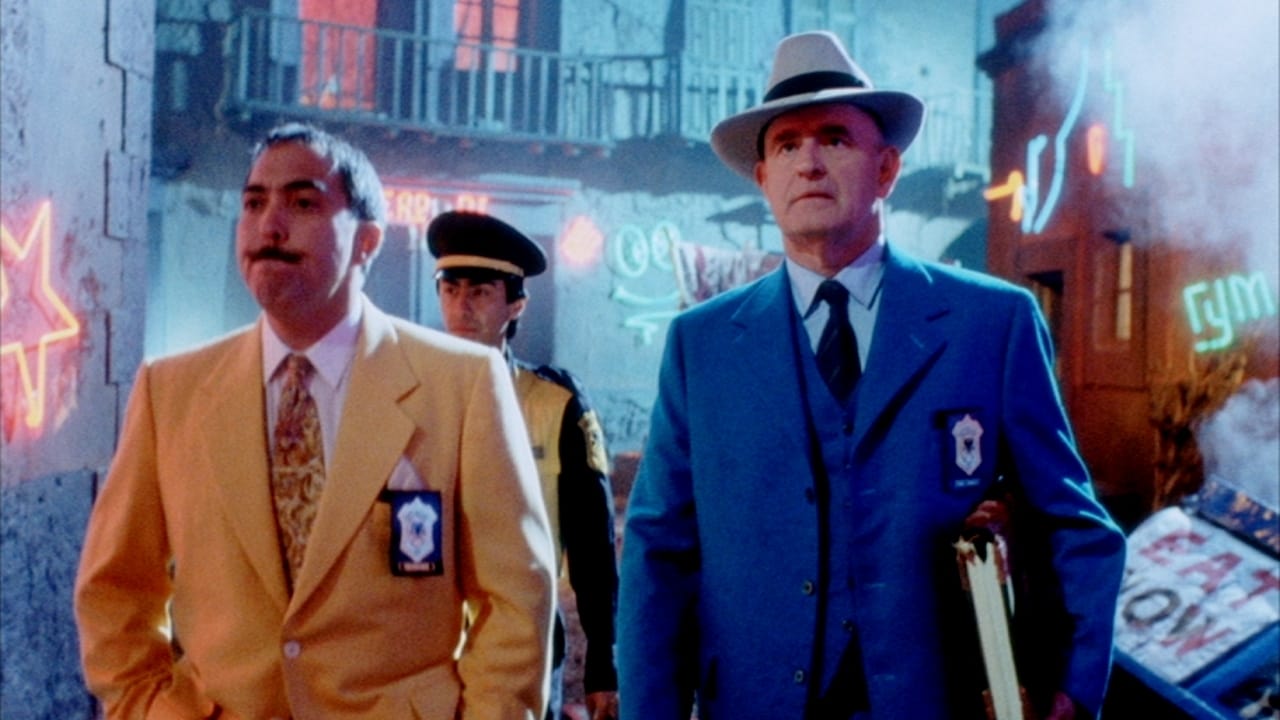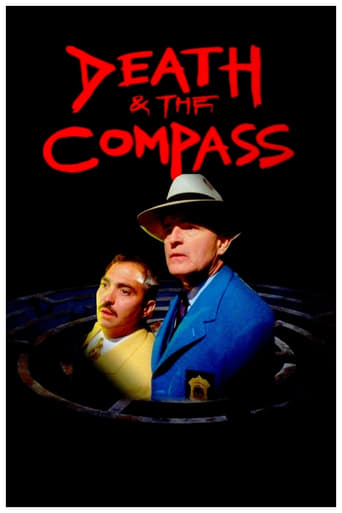

I respect Alex Cox the filmmaker, I really do. He's like the kid at school who you think at first is just trying a little too hard to be "different", a literary punk-rocker who has dipped more than his feet into spaghetti westerns and science fiction and fringe-culture and come out into the world ready to take s*** on... but then you see what he can actually do, the talent and raw feverish artistry and moments of true absurd hilarity capable of him, and you are ready to see whatever he has to offer. But there's two sides to his proverbial coin: he can either really hit it out of the park (Repo Man, Sid & Nancy, Walker arguably) or just try just a little too hard and pull way too many pretentious rabbits out of the hat (Straight to Hell). Death and the Compass falls into the latter category, and while I respect its (mostly) original approach to tackling a detective-killer story, it too falls on its face and its weirdness becomes oddly dull.It has a strange enough set-up and already irreverent style to follow: a detective, Erik Lonnrot, is after a killer with a hell-fire voice, Red (something), and it seems that the killer is leaving disturbing clues with his victims: scrawled in blood on the walls are messages that, according to eyewitness Alonso Zunz (Christopher Eccleston looking as if he just walked off Shallow Grave without changing his look) has religious significance in the Kabbalah. We follow Lonnrot on his case, and his methods of going after the perp, which include following at first a triangular and then compass-shaped pattern on the map- this despite the protests of the flabbergasted Commissioner Treviranus (Miguel Sandoval), who also looks back in flash-forwards sitting at a desk and speaking to the audience in garbled but sad descriptions of his former employee and colleague after the fact of the case.Oh, Cox has his moments of creativity and interest, such as a shot where we see the entire scope of the harrowing depths of the police station where Eccleston's character is taken in by handcuffs ("For his own protection" says Lonnrot in case of getting lost in the wrong room) and we're followed in a long tracking shot- maybe the best or just most curious- where we're taken through very dark hallways with very little direction, lost in the maze of turns and oddities among the characters. And it's never something that isn't fascinating to *look* at, with Miguel Garzon's cinematography a morbid delight. But The plot goes through hoola-hoops to keep things so off-beat it might as well be beat-less all-together. The performances, save for a confident Boyle and for Eccleston at the very end, are pretty bad, especially Sandoval who just seems to squirm in his seat reciting the goofy dialog given to him to speak at the audience.While the murder plot itself contains an intention for the audience that this isn't something we've seen before, that it's in a society with a good many rioters and architecture suggesting Alphaville's next decrepit wave, it too fizzle's out very quickly. What's the conflict here? I was never that much engaged with Boyle's own personal mission to find this killer, and only mildly caught up in the few flashes of deranged scenes of the killer (and/or killers) going after people like in the building early on (Cox himself has an amusing cameo). And just when I started to think it was leading up to something spectacular, with Boyle and Eccleston in that big ("not as big as you think") building in the South section of the city, it suddenly gives us a "TWIST" that we know in the back of our minds is coming but hope isn't, and it deflates any of the humdrum mystery it's been leading up to. For all of Cox's uncanny touches as a filmmaker, for all of his opposition to spoon-feeding the audience with a 'conventional' approach, which I do respect, Death and the Compass ultimately cuts one off at the brain-stem; it's masturbatory.
... View MoreBrilliant and diligent, but quirky and unorthodox detective Erik Lonnrot (splendidly played by the late, great Peter Boyle) investigates a bizarre series of murders in a bleak and chaotic futuristic city run by a strict totalitarian government. Lonnrot uncovers a complex occult conspiracy which places him in considerable peril. Writer/director Alex ("Repo Man") Cox relates the involving, intricate and elliptical narrative with remarkably bracing'n'bravura flashy, lively and insanely stylized aplomb, bringing a real sense of potent urgency, a playfully nutty tongue-in-cheek sensibility, and a ceaseless rapid-fire breakneck momentum to the fascinatingly eccentric story. Miguel Garzon's agile, prowling, restless cinematography makes especially adroit and exciting use of lengthy unedited takes. Pray for Rain's wonky and strikingly unique, yet catchy and rousing oddball score constitutes as another significant asset. The occasional fractured jump cuts are likewise quite effective and impressive. Boyle excels in a rare juicy and substantial lead, receiving bang-up support from Christopher Eccleston as an atheist religious expert and Miguel Sandoval as Lonnrot's loyal, sympathetic superior. The jolting surprise twist ending packs one hell of a startling punch. But what truly makes this film such a joy to watch is the feverishly hyperactive wealth of infectiously funky creativity and fiercely idiosyncratic originality evident throughout. A terrifically offbeat and inspired one-of-a-kind treat.
... View MoreThough "Death and the Compass" was reworked into a feature from a short project--and shows telltale signs of this--it might have succeeded better if only director Alex Cox had been content to allow the film's sound to come through clearly. The film has some great images and performances as well as funky avant-garde elements to both the visuals and story structure. However, when you're doing all that, you can only get yourself in trouble by also monkeying with the sound; here the dialogue is sometimes garbled, sometimes muffled, and sometimes mumbled (pick your poison).Based on the Jorge Luis Borges short story of the same name, "Death and the Compass" follows a detective who has chosen an "intuitive" path of detection, finally risking losing himself deep in a labyrinth of speculation as he attempts to guess, second-guess, and out-guess the criminal pattern unfolding before him. Unfortunately the film, largely due to the sound trouble, ends up nearly as jumbled as the story. The film is commendable for its referencing of many other Borges stories, but ultimately it leaves one wishing for a great deal more cohesion.One can look to Lars von Trier's "The Element of Crime" as a film that was, both in terms of story and stylistic flair, a comparable but far more successful venture. More obviously, one can look to Paul Miller's excellent "Spiderweb," a short film with a sort of "Guy Maddin" feel. "Spiderweb" is also based on Borges' "Death and the Compass" and stars Nigel Hawthorne. It is included on the DVD release of Cox's film (but somehow there is no reference to "Spiderweb" on the IMDb!).
... View MoreI had read a review of this film probably five or six years ago, but had never been able to find it anywhere and wondered if I ever would. I happened to catch it on cable last night by accident. I'm a huge fan of Borges and think this particular story is a masterpiece that equals Poe's greatest work in terms of pure intellectual force, profundity, and use of language and references. This movie version is fairly surreal and self-consciously stylized and does add a lot of details not in the story. But after about 10 minutes or so I started getting into this interpretation and thought that overall it was very clever and artful. Peter Boyle was an interesting (weird?) choice as Lonrott, and I thought Christopher Eccleston was excellent as Red Scharlach (including the sound effects for his voice). Most importantly, I thought this movie did capture the obliterating sense of the infinite that staggers me every time I read the story.
... View More